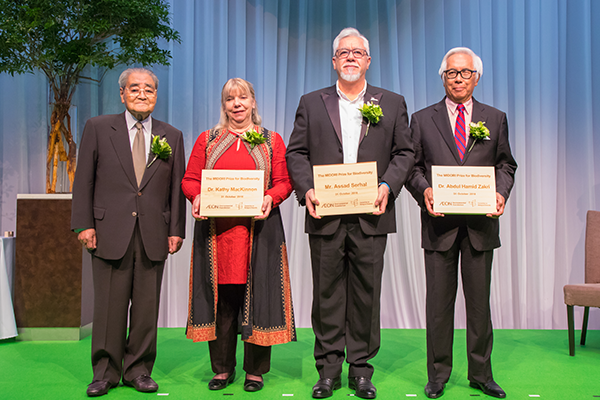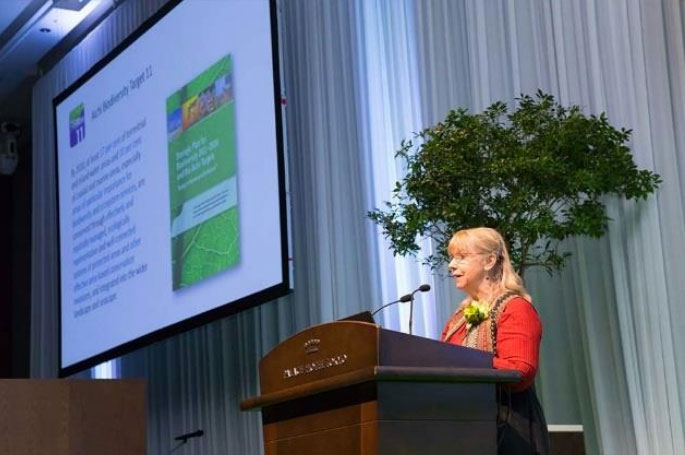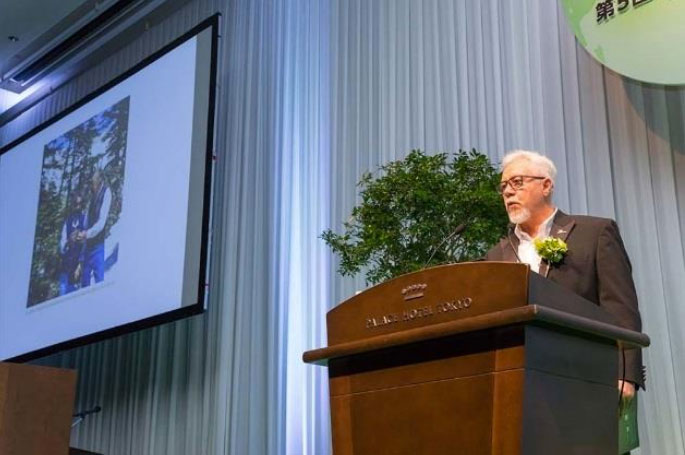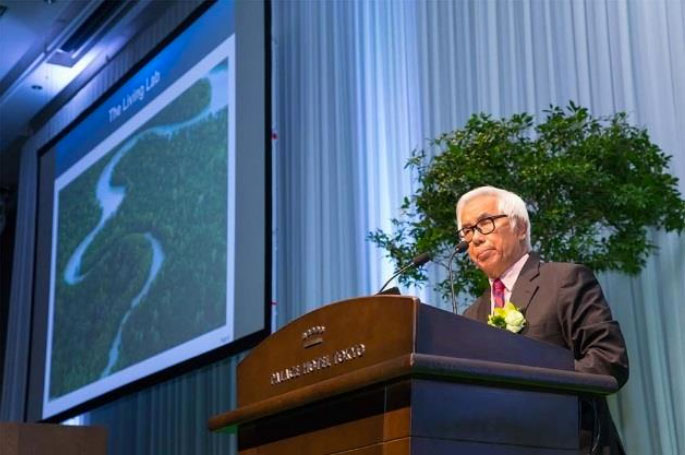The MIDORI Prize for Biodiversity 2018 –The award ceremony and winners’ forum were heldat the Palace Hotel, Tokyoon 31 October, 2018.
The MIDORI Prize is a biennial international prize co-organized by the AEON Environmental Foundation and the Secretariat of the Convention on Biological Diversity (CBD) to honor individuals who have made outstanding contributions to the conservation and sustainable use of biodiversityat the globallevel.
The winners of the 2018Prize are: Dr. Kathy MacKinnon,Chair of the IUCN World Commission on Protected Areas(U.K); Mr. Assad Serhal, Director General of the Society for the Protection of Nature in Lebanon(Lebanon); and Dr. Abdul Hamid Zakri,Former Science advisor to the Prime Minister of Malaysia (Malaysia).

Each of the Prize Winnerswas presented a wooden plaque, a commemorative gift and a monetary prize of 100,000 US dollars insupport of their work in safeguarding biodiversityby Mr. Takuya Okada, Chairmanof the AEON Environmental Foundation.
Dr. Cristiana PașcaPalmer, Executive Secretaryof the Convention on Biological Diversity representing the co-organizer of the Prize,offered her congratulationsvia a video message. Also, as a supporterrepresentative, Mr. HidekaMorimoto, Vice-Ministerof the Ministry of the Environment, delivereda congratulatory message. In addition, His Excellency Mr. Nidal Yehya, Ambassador of the Lebanese Republicattended and delivereda congratulatory address.
Lecture abstract of Winners’Forum
Following the award ceremony, the MIDORI Prize for Biodiversity 2018 Winners’Forum was held.Question-and-answer sessions withthe winners were moderated by invitee Mr. Takejiro Sueyoshi, Trustee of the AEON Environmental Foundation and Chairperson of the World Wide Fund for Nature, Japan (WWF Japan).
Dr. Kathy MacKinnon
Chair of the IUCN World Commission on Protected Areas(U.K.)
Theme: Protected Areas: Conserving Biodiversity and Underpinning Human Welfare
The IUCN World Commission on Protected Areasis the world’s premier network of protected area expertise.In particular, we carry outour activities to achieve Target 11 of the Aichi Biodiversity Targets. (Target 11: By 2020, at least 17 percent of terrestrial and inland water areas and 10 percent of coastal and marine areas, especially areas of particular importance for biodiversity and ecosystem services, are conserved through effectively and equitably managed, ecologically representative and well-connected systems of protected areas and other effective area-based conservation measures, and integrated into the wider landscape and seascape.)Thistarget is closely related to the “Sustainable Development Goals(SDGs)”,adopted at the United Nations Summit in 2015.

In the United Nations Environment Program, it wasreportedthat the earth’s temperature wasestimated to increase by about three degrees by the end of this century. While respondingto climate change andsolving global environment problemsare urgent issues, there are many instances of casesresulted in specific changes, such asthe conservation activities inthe Amazon region, whichholds around 10% of theworld’s carbon stock in terrestrial ecosystems, establishment of protected areas in Colombia and Palau, and the Work for Water Program in South Africa.
While carrying out conservation activities, we now also needto be more creative. Imagine what we couldachieve for biodiversity conservation and human wellbeing and welfareif we all came together!If everything came together, we would startto see a world in which all people equitably and inclusively experience the diverse benefits of connectedness with nature wherever they live, work, learn, or play and in the process also learn to give back to nature and the earth through actions that support nature and parksof all forms.
Let’suniteand work together tochange the world!
Mr. Assad Serhal
Director General of the Society for the Protection of Nature in Lebanon(Lebanon)
Theme: The HIMA, A Way of Life; A Mission of Peace
Although Lebanon is a small country, it hasa typical Mediterranean temperate climate and lies onthe second most important flywayfor migratory birdsin the world, as well as hosting uniquebirds and biodiversity. Meanwhile, overhuntingand poaching of birdsstill occurs. The purpose of the Society for the Protection of Nature in Lebanon(Birdlife Lebanon)is to protect Lebanon’s nature, birds and biodiversity for the people and to realize the sustainable use of natural resources through the HIMA.HIMA is a traditional local-based conservation system similar to Japan’s“Satoyama”. It was a system that began 1,500 years ago in the Middle East but has been overlooked for the past centurydue to geopolitical issues. Lebanon has been at the forefronttorevive HIMA,the first of whichwas established in 2004. To date,we have a total of22 HIMAin Lebanon.

To maintain theHIMAsystem, we needto promote HIMA’s empowerment, to respect bottom-up approaches, and to produce economic incentives. In order to realize these, one approachis to collaborate with the private sector, such as in branding agricultural productsmade of natural resourcesfromHIMA. It is also important for people, especially the young( Homat AL-Hima )as agents for change,tolearn about the related communities and regions, and seek outjobsthatco-existwith the local nature. This will help them respect and make them more aware of the need to protect such regions. Creating jobs in the regionsisthekey.
First of all, we all need to discuss how to createa common framework for the future. In this process, a common objective will bedetermined, and by reflecting that objective in policies, legislations and practices, it will bepossible to move toward realization of the goal.
Dr. Abdul Hamid Zakri
Former Science advisor to the Prime Minister of Malaysia (Malaysia)
Theme: The politics of biodiversity loss -why one should make a difference
Today’s story ismy personal story, and at the same time it is also a story for everyone. It is a story abouthow we can change the situation by adopting an approach of deliberation and actionagainst theprospect of global disasters,which threaten the whole of humanity and life on earth. Eachof us is a party.

The problemsof biodiversity loss and decline of ecosystem services are nothing new. As seen in “Silent Spring” by Rachel Carson in 1962, the problem has been with us for some timeand has been discussedat the United Nations Conference on the Human Environmentand the Convention on Biological Diversity, and so on. But,as the 2010 biodiversity Targetconservation has not been achieved, the world has failed tosolve this problem and the situation has only beenworsening. In Malaysia, tropical rainforests arerapidly disappearing due to economic activity.
The biggestfactorinthis situationis the lack of people’s perception. In order to improve on this, we must be persuasive, reasonable and easy to understand.In addition, we need to show that wealth and job creationas well ashuman happiness are things that can onlycome about if we havebiodiversity.Only a persuasive “why” resonating throughout society will be successful in waking us up to theurgent needto negotiateover the who, what, where, when and how ofhaltingdisastrous biodiversity loss. Here, three qualities are asked ofscientists in order to convince other stakeholders about the serious effectsof loss of biodiversity:Credibility,Relevance, and Legitimacy. Here are the factors of why one should make a difference, i.e., the one who couldchange the situation in the future.
“If humans wereto be wiped offfrom the surface of the earth today, the birds and the trees would still be heretomorrow. If the birds and trees wereto go extinct today, humans would be wiped out from the surface of the earth tomorrow.”
The Forum was brought to a close with a comment from Mr. Takejiro Sueyoshi, the moderator.
In 2015, the Sustainable Development Goals (SDGs) were set and the Paris agreement was adopted. As part of this process, roles have been partially shifting from state to non-state actors. While policies are still important, the roles of all of us, such as the private sector, civil societies, and so on, those who should be implementing the policies, have been increasing.
Dr. Zakri introduced to us the wise words of a Native American in the lecture. I would like to conclude this forum by introducing another Native American saying.
“When the last tree is cut down, the last fish eaten, and the last stream poisoned, you will realize that you cannot eat money”.
